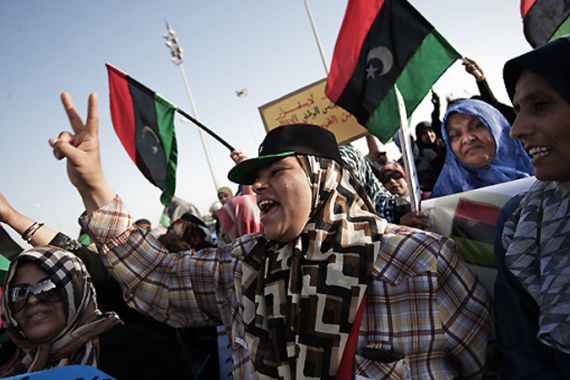Libya PM says no talks until bombs stop
UN envoy’s visit yields little in Tripoli where government loyalists stick to demands that Gaddafi must remain in power.

| Hoda Abdel-Hamid reports on the return of Libyan families who were expelled from Misrata by Gaddafi forces |
A United Nations envoy trying to find a way to end Libya’s war has made little visible headway on a visit to
Tripoli for talks with the prime minister.
The government told him on Tuesday that NATO must end air strikes before any talks can begin and that Muammar Gaddafi’s role as leader was non-negotiable, though rebels and the West insist he step down.
Britain and France, carrying out most of the NATO bombing attacks, this week dropped their insistence that Gaddafi leave the country as part of any settlement, in an apparent softening of their position.
The UN envoy, Abdul Elah al-Khatib, arrived in Tripoli straight from talks with rebels in their eastern stronghold of Benghazi on Monday.
He met Prime Minister Al-Baghdadi Ali Al-Mahmoudi who said they had a productive dialogue – but about implementing UN resolutions, not negotiating an end to the five-month-old conflict in which neither side seems to have the upper hand.
“This aggression [air strikes] needs to stop immediately, without that we cannot have a dialogue, we cannot solve any problems in Libya,” Mahmoudi told a news conference afterward.
NATO deadline looms
In London, the British and French foreign ministers, William Hague and Alain Juppe, called once more for Gaddafi to leave power but, on the matter of whether he could stay in Libya, both said it was up to Libyans to decide.
Britain said it had not changed policy but comments by Hague were interpreted as tacit backing for the proposal, floated last week by France, that Gaddafi could remain in Libya.
A rebel leader this week appeared to endorse the view, which would mark a major shift from previous rebel demands that he leave and be tried for war crimes in The Hague.
Deadlines are approaching for the NATO-led alliance, whose UN mandate for military action – granted on the grounds that it would protect civilians – expires in two months.
Talks and conditions
Gaddafi says he supports talks with the rebels and the West, but has shown no sign of agreeing to cede power after 41 years of unchallenged supremacy, much of it as a pariah in Western eyes.
In his talks with the Benghazi-based rebel leadership council, Khatib discussed ideas for ending the war
but said later a firm initiative had yet to take shape.
“We did not put a plan in front of them. We discussed the views and ideas on how we can trigger a political process … to achieve a political solution,” he told Reuters.
He has said his ideas involve a ceasefire and, simultaneously, setting up a mechanism to manage the
transitional period. He has not given details.
Senior rebel official Mahmoud Jibril said he had underlined that the rebels would only accept an initiative that involved the removal of Gaddafi from power as a first step to peace.
Stay or go?
Rebel leaders have given conflicting signals in recent weeks over whether they would allow Gaddafi and his family to stay in Libya as part of a deal, providing he gave up power.
“Gaddafi can stay in Libya but it will have conditions,” opposition leader Mustafa Abdel Jalil told the Wall Street Journal. “We will decide where he stays and who watches him. The same conditions will apply to his
family.”
But the rebels seem unlikely to unseat him any time soon. They said they had almost taken the oil town of Brega a week ago, but later said minefields had slowed their advance.
The Libyan news agency JANA said Foreign Minister Abdelati Obeidi was in Tunisia on Tuesday for talks over “initiatives that were taken about what’s happening in Libya, chief of which is the African Union’s initiative”. The African Union plan does not insist on Gaddafi standing down.
Meanwhile, also on Tuesday, Libyan expats became the first to take a stab at forming a political party in Benghazi, headquarters of the opposition National Transitional Council, the AFP news agency reported.
“We call ourselves the New Libya Party because everything was destroyed,” said Ramadan Ben Amer, 53, a co-founder of the party, and now a resident of the UAE.
“Gaddafi says he has built Libya brick by brick but, especially Benghazi, he has destroyed it brick by brick.”
He said that of the 2,000 individuals who have joined the party in Libya so far, the majority hail from his native Benghazi or Derna – the hometown of co-founder Rajad Mabruk, 65, who lives in Dallas, Texas. The party is also supported by some 20,000 Libyan expats living in the US, Canada and Germany, he added.